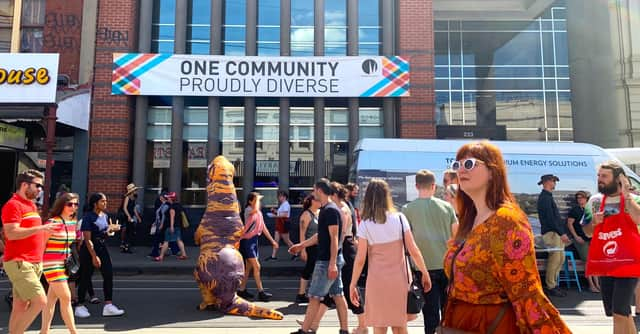20-minute neighbourhoods could reduce carbon footprints while deepening our sense of place - May East


Initially defined by the time it takes to walk to your destination and back again, since the pandemic it has become a spatial metaphor for discovering and deepening the sense of belonging to your local community.
In Melbourne the notion of ‘living locally’ is about giving people the ability to meet most of their daily needs within a 20-minute return walk from home, with access to safe walking and cycling routes and low carbon public transport options. In Portland, the city’s Climate Action Plan sets an objective for 2030 calling for vibrant neighbourhoods in which 90 per cent of Portland residents can easily walk or bicycle to meet all basic daily, non-work needs.
Advertisement
Hide AdAdvertisement
Hide AdIn short, 20-minute neighbourhoods can be seen as settlements of human scale and short distances where living and working are reconciled and long trips to work becomes unnecessary. It is also where social and cultural activities, recreation and leisure take place.


Many places around the world are engaging in conversations and drawing up plans to support the realisation of the concept. So far, only a few cities have made 20-minute neighbourhoods a reality, but many places have begun to embrace the concept, including Scotland where the Scottish Government is working with local government and other partners to take forward ambitions for 20-minute neighbourhoods across both urban and rural settlement areas.
Edinburgh City Council has embraced a thrilling target to become a net-zero city by 2030. This means that any greenhouse gas emissions put into the atmosphere are balanced out by those removed. A key strategy to achieve its emerging City Plan 2030 in eight years is the establishment of 20-minute neighbourhoods, which aims to build on Edinburgh’s strong sense of local community.
Every journey starts with the first step. A key first step is to have residents at the table shaping the discussions. So much has been said about the importance of including people in the decisions that affect their way of life. To harness the potential of 20-minute neighbourhoods a participatory approach to urban planning where citizens define and address their own needs and aspirations must be viewed as an end of its own.
A 20-minute neighbourhood should aim to be an emission-free settlement limiting carbon-emitting traffic. This can be achieved by planting native species and productive plants as well as covering facades with climbers, establishing natural corridors between areas, creating eatable landscape in every corner, establishing EV car co-ops, improving pavements and cycle lanes and adapting comprehensive car-free zones, as many of the European capitals have done.
Different from consultation, where decision makers and experts present pre-prepared potential scenarios, participatory urban development is a field where stakeholders robustly negotiate divergent interests. This was the basis for a successful participatory budgeting movement that emerged in Porto Alegre, Brazil in the 80s. Unlike other ‘consultative’ top-down approaches, this movement put financial decision making in the hands of the people most affected. It is a process of decision making which engage the service users from the start perfectly in tune with the 20-minute neighbourhood concept.
The re-engagement with green spaces and the spirit of community awakened during the pandemic gives us the growing evidence that the localisation of our lives could lead to substantial reductions in carbon footprints while deepening our sense of place. Participation by the residents in 20-minute neighbourhood plans is essential for realignment of political power in favour of all those voices who are rarely heard and may be an antidote to the grand and often unfulfilled master plans of the past.
May East, UN House Scotland Director of Cities Programme
Comments
Want to join the conversation? Please or to comment on this article.